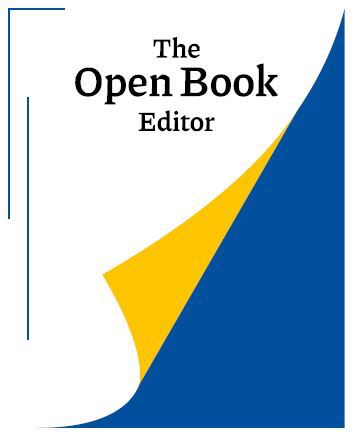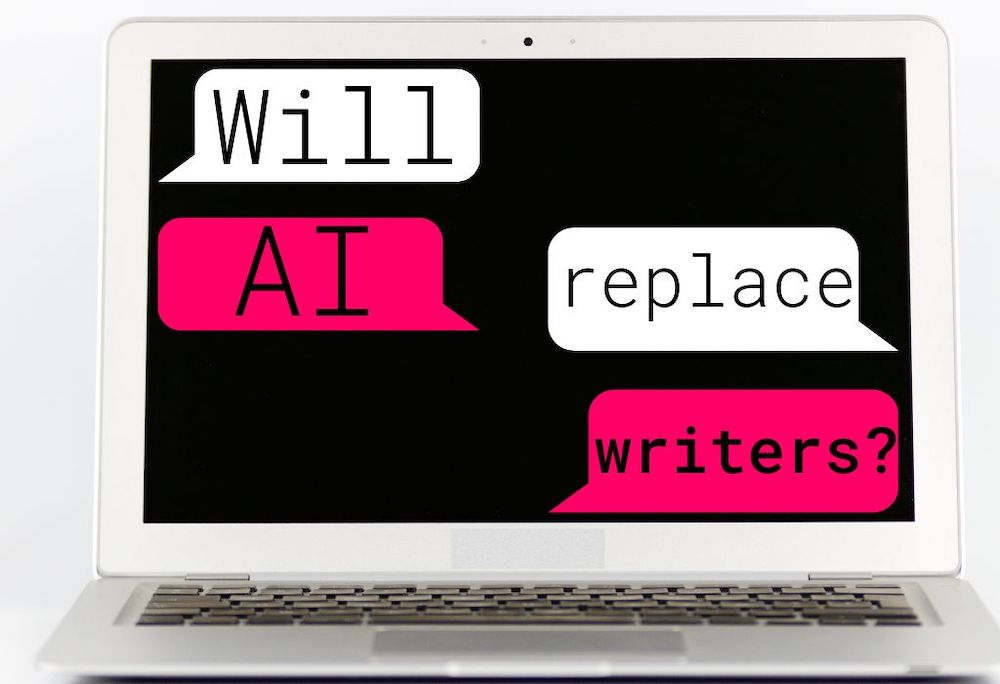Artificial intelligence (AI) has made incredible strides in recent years. So much so that some AI technology is now capable of writing text that sounds human-produced. This has raised more than a few valid concerns and many are wondering if AI will replace writers and novelists.
Perhaps you’re worried, too, and find yourself questioning what this means for those with creative professions. Will AI replace writers? Should you even bother finishing your story? Are human editors needed if an AI can do the work for you?
Spoiler alert: There’s hope!
Read on to learn more about AI and what AIs like ChatGPT mean for writers and novelists.

Table of Contents
What is AI and how does it work?
Does this mean AI can write my book for me?
Should writers be worried about AI?
What are the imperfections of AI?
Will AI replace writers and book editors?
But don’t worry, creative pursuits are still worthwhile!
What is AI and how does it work?
When you hear the term artificial intelligence, or AI, it probably conjures up images of robots and supercomputers. But what does AI mean really and how is it used?
How AI works
AI is the science of making intelligent machines. This technology gives computers and machines the ability to mimic human problem-solving and decision-making skills. To put it in plain terms, AI can enable computers to do two things:
- Find, perceive, infer, and collect information.
- Use this information to carry out tasks or solve problems that would usually require human intelligence.
In order to do this, the AI database is constantly fed new data and information. Also, AI observes how we humans interact with certain tools. It then uses this information to find better or faster (or both) ways to do certain tasks.
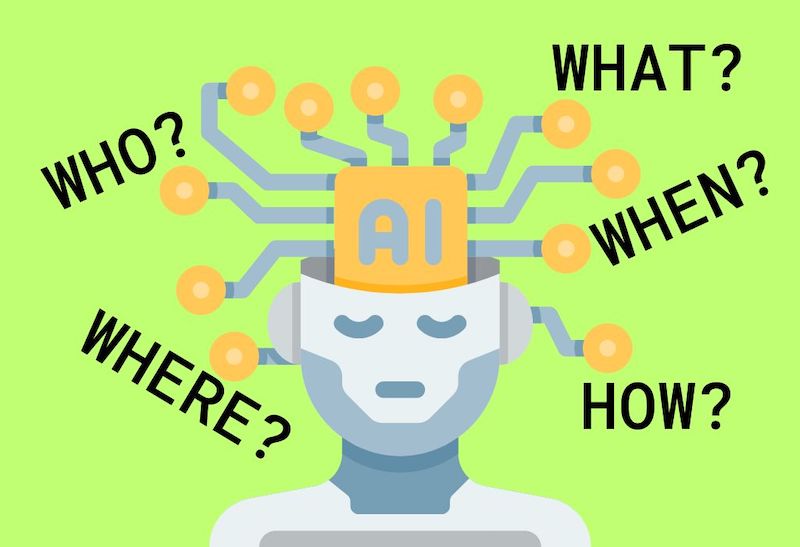
What is ChatGPT?
ChatGPT is one of the biggest buzzwords floating around at the moment. This is the AI that writers are most concerned will replace them (although, it’s not the only one).
That’s because of the way this language AI engages with users. Interacting with it functions a lot like a conversation with another human. In doing so, it can perform a huge array of tasks. This ranges from answering questions (a little like how Google functions) to producing “new” content.
It is also capable of adjusting its output depending on the specifications of your request or your follow-up conversations.
For example, let’s say you are having trouble creating a character for your book. You can input certain specifications (i.e. “I need a fictional female character living in South Carolina”). Immediately, you’ll receive a description that includes what she looks like, her hobbies, her job, and various other details.
Not quite happy with the character outline? You can follow up with another request. Perhaps something like, “give her a different job” or “she has a dark past”. Then, ChatGPT will tweak and adjust the profile accordingly.
So, how does AI do all this? ChatGPT has at its disposal the largest man-made database of knowledge ever amassed in human history: the internet.
To put it as simply as I can (and I’m probably offending AI engineers around the world with this description), it works like a search engine to scour its data source for information relevant to your request/question. But it doesn’t just formulate an answer based on what you asked, but also how you asked it. Is it any wonder writers are worried this AI could some day replace them?
Does this mean AI can write my book for me?
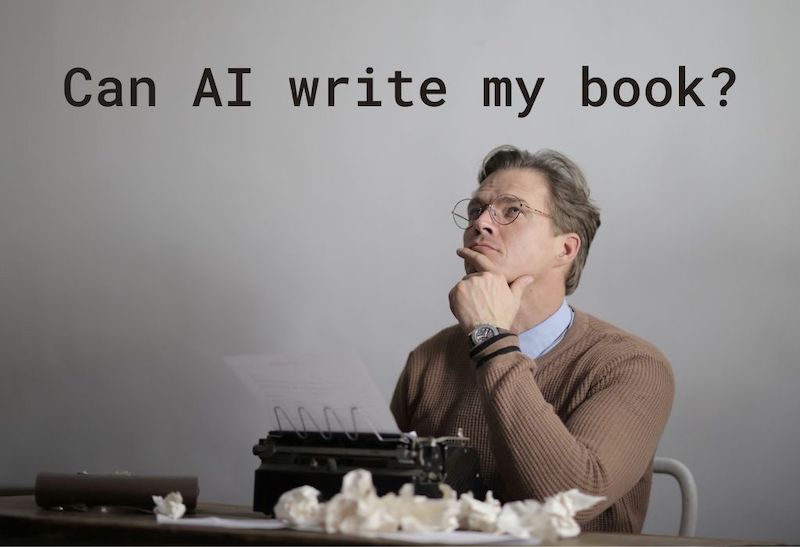
AI is capable of a multitude of writing tasks. Hence, it may seem like you can simply sit back and let it do all the hard work. But can AI write your book for you?
Technically, yes. In fact, someone’s already done this. Recently, someone made a children’s book entirely with AI. And publishers are already being flooded with AI-written books.
So, it is possible to prompt AI to write your book for you. However, there are some very negative outcomes to this.
The major one is that it completely defeats the point of the creative process. Writers are passionate about writing. Most will tell you that all aspects of the writing process are fulfilling in the long run. Yes, even the hard, frustrating parts!
Asking a machine to do the work for you takes away the joy and satisfaction of pouring your heart and soul into a piece of writing.
And regardless of how closely AI can capture your writing style, it’s not capable of infusing your book with the sort of nuance that comes from your unique voice and lived experiences.
Furthermore, you could face some serious plagiarism issues if you solely rely on AI to write your book for you. This is because AI only uses the information it can draw from similar information it finds online, i.e., writing published by other authors.
Also, with the technology still being so new, it’s currently (April 2023) a little hairy as to whether users are legitimately allowed to use ChatGPT’s output for commercial gain.
Should writers be worried about AI?

AI capabilities are constantly changing. As the technology gets better and more complex, it will begin to replace many jobs.
Unfortunately, as a writer, you should be at least a little apprehensive about AI. After all, it is already being used to churn out web content.
As the technology improves, AI will begin to have an impact on novelists and book authors too. Self-publishing sites (like Amazon) and publishing houses will be bombarded by AI-created books (it’s already started).
Even if the quality of these books is not nearly as good as what humans can produce, they will still crowd the market. This will make it harder for human authors to find a readership.
Meanwhile, publishers will be faced with how to detect and manage AI-created novels. Some publishers may even decide to cut out the writer altogether. They may find it easier to use AI to create their own books, saving on paying advances to authors.
In truth, editors, cover designers, book formatters, and publishing houses will all feel the strain alongside authors.
What are the imperfections of AI?
There’s some good news amidst all this doom and gloom.
While AI is indeed capable of many great things, there are also quite a few glaring imperfections in the technology.
Plagiarism and lack of originality
AI can only use information that’s already out there, which leads to issues with plagiarism. Particularly because AI doesn’t seek permission from the original creators to use their work.
When AI produces something—whether it be text, an illustration, or a prompt—it doesn’t tell you the provenance of any of the information that goes into creating it.

Let’s say you ask AI to create a book cover for your romance novel. It will pull from images already available and tack together a new image. Because the original creators are not credited, many argue this is stealing from existing artists and creators.
Another negative side-effect of AI-produced books is that it may lead to novels and their covers in a specific genre all looking and sounding the same or, at least, lacking in originality.
AI information isn’t 100% trustworthy
AI can be useful as a research or brainstorming tool. However, experts warn users to beware of believing all AI-produced information.
In addition to having a high rate of answering questions incorrectly or providing incoherent information, the true issue lies in how the answers are worded.
AIs, like ChatGPT, have the capacity to make the response sound completely correct or plausible. In reality, it often isn’t (it even has a bad habit of making up sources but making them look real).
This can lead to everything from inserting incorrect facts and details into your book to helping to spread conspiracy theories and disinformation.
Will AI replace writers and book editors?
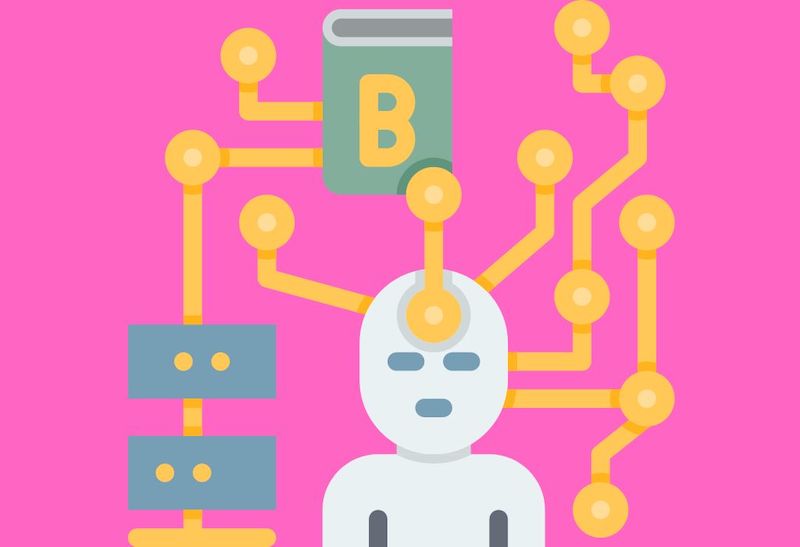
The good news is that AI will struggle to replace long-form writers such as novelists. Why? Because AI currently cannot produce the sort of emotional, nuanced, and detailed writing that real writers can, especially over longer strings of text.
The longer the AI output goes on, the more repetitive it becomes and the more obvious it is that something isn’t quite right.
As for whether this will change in the future, the answer is probably. People will use AI to write books and produce book covers and images. But at some point, the market will become over-saturated with similar-sounding and similar-looking books. In this scenario, it will be the ones with unique, independent human creativity that attract a readership.
Likewise, while AI can edit basic grammar, it’s incapable of editing for believable characters, story and world-building, consistency, fluidity, and style across a whole book. It can’t display the refined abilities of a human book editor. And it’s not capable of editing your book while protecting and preserving your unique style.
AIs like ChatGPT call upon the same kind of technologies as those used by apps like Grammarly. This means that it’s prone to making similar mistakes. Furthermore, it tends to make the language sound stiff, formal, and flat.
The connection between author and editor is also of paramount importance and continuously changing. AI can’t personalise the editing experience or forge a personal relationship the way an actual editor can. Your book is your baby. Hence, most authors want to entrust it to someone with the emotional capacity to care about it like they do!
And finally, AI will struggle to fully replace writers and editors because it’s simply not accurate enough. AI’s tendency to make up facts and sources that look and sound real is a huge issue. And it means fact-checking and proofreading are more important than ever!
Can AI be useful for authors?
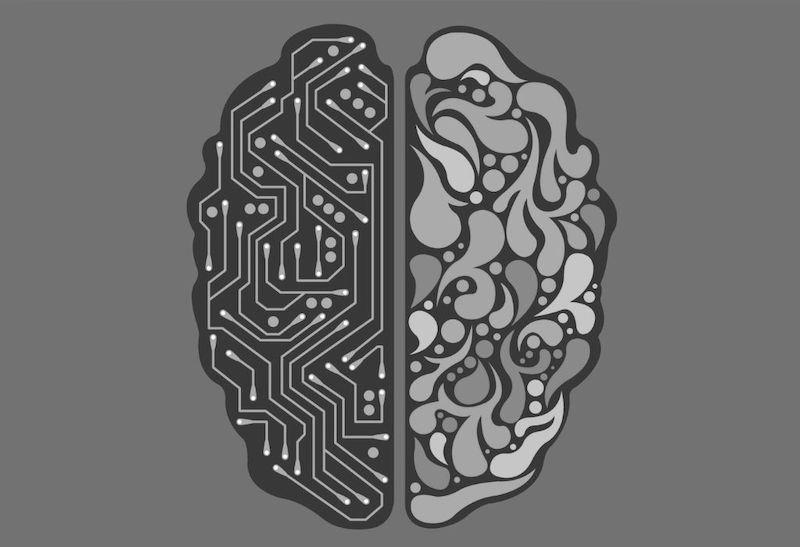
Since AI is here to stay, it’s important that you try to see it as a valuable tool, instead of a foe you fear. Here are some ways that you as an author can benefit from using AI:
- Ease the planning process. AI can actually make planning your book easier. This frees up more time for you to spend writing (and who doesn’t love that?).
You can ask AI to help you come up with an outline for your book or a scene outline. Because it’s so fast, using AI for these aspects of writing can be a huge time saver.
Just always keep in mind that the ideas AI produces for you are probably the same as those it produces for others. So, try to be specific.
- Eliminate writer’s block. Writing prompts are a great way to help get your writing creative juices flowing. Especially if you’re stuck on a story or simply looking to write something new.
I requested a writing prompt from ChatGPT, and this was the result:
Sure, here’s a writing prompt for you: Write a story about a person who wakes up with the ability to time travel. They soon realize that every time they change something in the past, it has unexpected and unintended consequences on their present and future.
- Character prompts. As mentioned above, ChatGPT can be a useful tool in helping you create characters for your book.
AI can certainly provide some useful prompts to help get your brain gears turning. But it’s important to not rely too heavily on AI as its answers will still be quite generic.
You want to have well-rounded characters in your book that feel, well, like real people. So, you’ll need to flesh them out a lot more on your own.
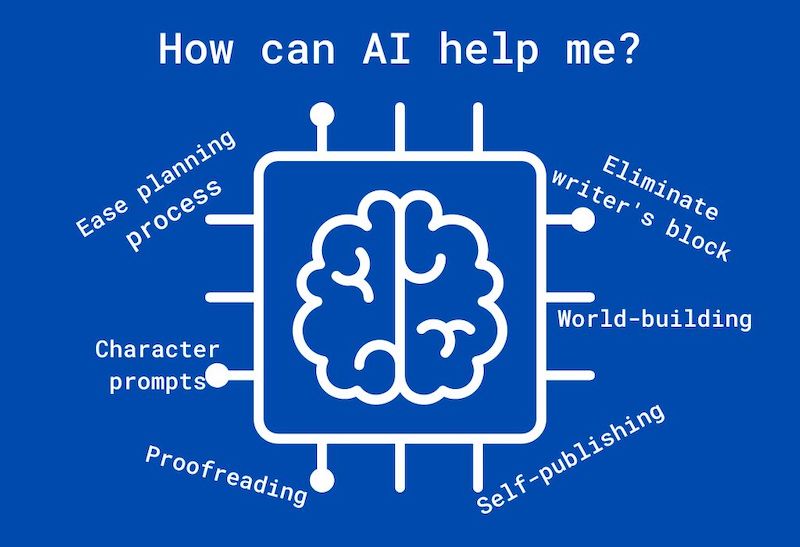
- World-building. AI can help you to brainstorm settings and new worlds. It can even help you figure out the practicalities of building a world on, for example, a desert planet.
However, like with creating well-rounded characters, you should not simply copy and paste these ideas into your manuscript. To create a believable world, you need to add more details yourself.
- Basic proofreading. AI language models can offer basic editing and proofreading, which can be incredibly helpful to writers. It can detect grammar and spelling issues, scan the text for plagiarism, and even format the style.
Again, just like AI cannot replace writers, it shouldn’t be a replacement for real-life book editors. AI can help with surface-level editing and proofreading. What it can’t do is go into depth with your book the way a professional human editor can.
- Streamlines the self-publishing process. Some authors find self-publishing intimidating because of the time it can take to create, publish, and market a book. This is another area where AI can save authors a lot of time.
AI can facilitate the self-publishing process by suggesting marketing materials and other ways to boost your book’s visibility!
Creative pursuits will always be worthwhile!

The market and publishing models will likely change as AI improves and AI laws are introduced around the world. Yes, AI may replace writers to some extent. However, your creative efforts are still, and will always be, worthwhile and absolutely worth pursuing!
As human beings, we value our own creativity and the creativity of others. Pretenders will use AI to mimic genuine writers, but can’t truly replace them. And they won’t experience the satisfaction of creating something that is truly new, truly theirs.
Once the market is flooded with AI books, people will eventually grow bored of reading the same stories. Some publishing houses will make it a badge of honour to say they only publish the work of the genuine authors and creative writers. So, take heart and keep writing!
